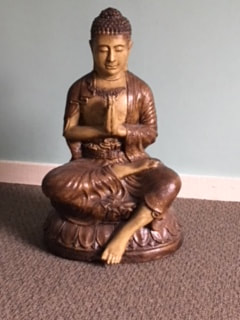
During a civil war in Japan, militias often invaded little villages. In one village everyone heard solders were coming and fled. When the militia arrived the village was vacant . . . except for one person, a zen master who remained to take care of the temple. The general of the army went to the temple to see who this lone inhabitant.
When he arrived the master didn’t bow or grovel. He didn’t even speak to the general at all. Feeling disrespected, the general became angry. He drew his sword and shouted, “You fool. Don’t you realize I could run you through without blinking an eye?” The Zen calmly replied, “Do you realize I could be run through without blinking an eye?” Surprised and awed by the master, the general simply left.
This encounter, which is a popular teaching in the Zen tradition, is about equanimity or balance in the presence of various life issues. Using the prospect of one’s death, which is for many the greatest life fear, the story teaches that one can face anything – including death – in a balanced way. There is no need to react, cringe in fear, or panic.
Equanimity is something which ought to be brought into all events which come our way. In times of pain and pleasure, in times of sorrow and happiness, we can train ourselves not be carried away by our emotions remembering to remain in a balanced state.
For example, when we learn someone has gossiped about us we do not react by gossiping back nor feeling broken by what was said. When we are treated with contempt and rudeness, we do not lash out with anger. Or, when someone we love has been diagnosed with a life threatening illness, we do not collapse in dread. We choose to remain balanced, calm, even serene.
Swami Sivananda emphasized this when he wrote: One needs physical, mental and inner spiritual strength sat all times. One requires this inner strength especially during the time of disturbance, agitation and confusion
 RSS Feed
RSS Feed